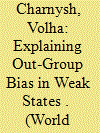| Srl | Item |
| 1 |
ID:
186700


|
|
|
|
|
| Summary/Abstract |
Understanding sources of judicial bias is essential for establishing due process. To date, theories of judicial decision making are rooted in ranked societies with majority–minority group cleavages, leaving unanswered which groups are more prone to express bias and whether it is motivated by in-group favoritism or out-group hostility. We examine judicial bias in Kenya, a diverse society that features a more complex ethnic landscape. While research in comparative and African politics emphasizes instrumental motivations underpinning ethnic identity, we examine the psychological, implicit biases driving judicial outcomes. Using data from Kenyan criminal appeals and the conditional random assignment of judges to cases, we show that judges are 3 to 5 percentage points more likely to grant coethnic appeals than non-coethnic appeals. To understand mechanisms, we use word embeddings to analyze the sentiment of written judgments. Judges use more trust-related terms writing for coethnics, suggesting that in-group favoritism motivates coethnic bias in this context.
|
|
|
|
|
|
|
|
|
|
|
|
|
|
|
|
| 2 |
ID:
185604


|
|
|
|
|
| Summary/Abstract |
Two dominant explanations for ethnic bias in distributional outcomes are electoral incentives and out-group prejudice. This article proposes a novel and complementary explanation for the phenomenon: variation in legibility across ethnic groups. The author argues that states will allocate fewer resources to groups from which they cannot gather accurate information or collect taxes. The argument is supported by original data on state aid from the 1891/1892 famine in the Russian Empire. Qualitative and quantitative analyses show that districts with a larger Muslim population experienced higher famine mortality and received less generous public assistance. The Muslims, historically ruled via religious intermediaries, were less legible to state officials and generated lower fiscal revenues. State officials could not count on the repayment of food loans or collect tax arrears from Muslim communes, so they were more likely to withhold aid. State relief did not vary with the presence of other minorities that were more legible and generated more revenue.
|
|
|
|
|
|
|
|
|
|
|
|
|
|
|
|
| 3 |
ID:
143371


|
|
|
|
|
| Summary/Abstract |
Using data for trade credit practices, this work investigates interfirm trust formation by ethnic minority firms in the Xinjiang Uygur Autonomous Region, China. The main findings of this research are as follows. First, there is a general ethnic bias against ethnic minority firms in receiving trade credit. Second, ethnic minority firms are less eager than Han firms to build interfirm trust with their business partners by offering trade credit, which is partly due to their financing constraints. Third, ethnic minority firms have less trust of other ethnic minority firms in offering trade credit. Fourth, these trade credit practices by ethnic minority firms tend to be more pronounced in those surviving after 2005. Fifth, ethnic minority firms do not share their members' information regarding productivity within their circle of ethnic minority firms. Overall, interfirm trust is insufficiently formed, even among ethnic minority firms.
|
|
|
|
|
|
|
|
|
|
|
|
|
|
|
|